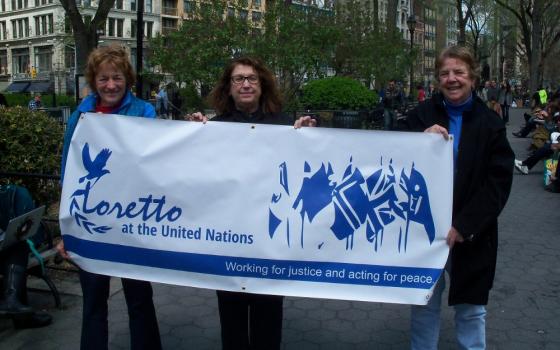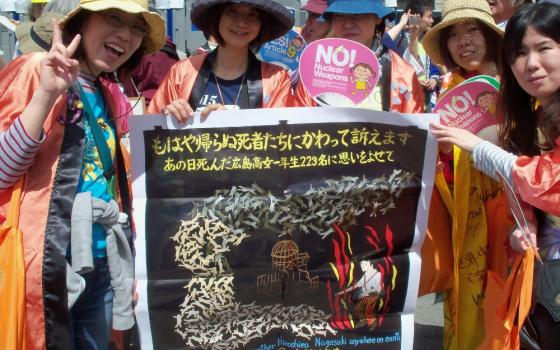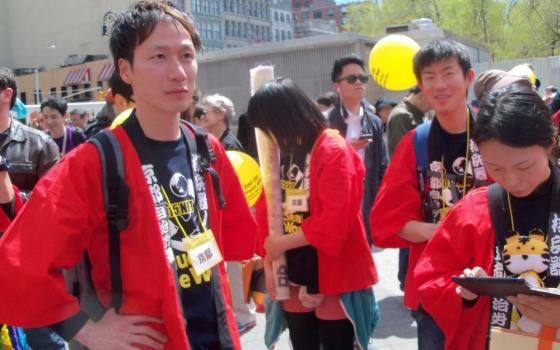As part of the Loretto Committee for Peace I attended the Peace & Planet people’s mobilization weekend April 24-25 and the first few days of the U.N. Review of the Nuclear Non-Proliferation Treaty. Since 1978 the Loretto Community, sisters and co-members, has formally opposed the production and use of nuclear weapons – even as deterrence. Our committee is proposing to our Loretto Assembly this summer that we call for the U.S. to unilaterally disarm all nuclear weapons.
The Peace & Planet gathering included a march to the United Nations. The youth and vibrancy was striking. It was the Japanese who were the spine of the march, dressed in bright colors and carrying gifts of paper cranes to symbolize hope and paper dragons declaring (with words inside their mouths) that they would eat the bombs. It was theater saying gently that the Japanese know the horrors of nuclear war.
On April 29, I was present when H.E. Archbishop Bernadito C. Auza, the Permanent Representative of the Holy See to the U.N., spoke to the U.N. delegates. He said that nuclear weapons are “per se inhumane and unethical.” Later that day I received several congratulations on behalf of Pope Francis from members of Non-governmental Organizations (NGOs) who knew I am a nun.
The Vatican has shifted its position. The former Vatican position was that it was wrong to use nuclear weapons but that the threat of deterrence was acceptable, a position that became more nuanced at the end of the Cold War. Tom Fox at NCRonline.org has described in detail how bishops in the U.S. and at the Vatican grew skeptical that the countries possessing nuclear weapons had any plans to give them up.
Now Archbishop Auza tells us that “The theory of nuclear deterrence is too ambiguous to be a stable and global basis of world security and international order.”
This five-year review conference of the Nuclear Non-Proliferation Treaty (NPT) goes through May 22. The delegates are striving to write a consensus document about compliance with the NPT, which calls for eventual nuclear disarmament. The General Assembly has chosen in recent years to operate by consensus whenever possible because a consensus document carries more weight – but of course compromises may make it weaker, or, in the case of the NPT, perhaps impossible to accomplish.
The Holy See is not alone in its call to ban nukes. But the countries that have them want to keep them: the United States, Russia, China, France, the U.K., India, Pakistan, Israel and North Korea.
Moreover, U.S. nuclear bombs are stored in five NATO countries: Belgium, the Netherlands, Italy, Germany and Turkey. The first four countries are charged with delivering the bombs to defend NATO members. Turkey’s stored bombs would be delivered by the U.S. Air Force.
That first week of the NPT Review began with statements from all the nation-states and from sub-groups such as Latin America’s nuclear-free zone coalition and observers including the Holy See and the International Committee of the Red Cross. Then on Friday, May 1, the NGOs gave presentations to the delegates about the failure of the nations who possess nuclear weapons to appreciate the humanitarian dangers of these weapons. The NGOs propose a new treaty to ban nuclear arms flat out.
The NGOs have a strategy – to stress the humanitarian consequences of possessing and possibly using nuclear weapons; that is, both the trade-off of meeting human needs with the cost of building these weapons and the human cost of using them.
The NGOs have partnered with non-nuclear states such as Mexico, Norway and Austria to hold three conferences, the most recent in Vienna last fall. Pope Francis sent that same strong message then: that it is wrong even to possess nuclear arms.
Many of these NGOs are major actors in the disarmament and nuclear abolition movement. They’ve been working together for decades, sharing research and developing action plans.
Indeed, while the diplomats are giving speeches in the familiar General Assembly Hall, side events in the basement present issues like Scotland’s opposition to the nuclear bases there; the cost of the NATO nuclear delivery systems; daily briefings by ambassadors; the size and components of the Trident system; and the costly modernization of nuclear weapons now in process.
The Physicians for Social Responsibility presentation on global health effects of a small nuclear war was particularly graphic in focusing on humanitarian consequences. Suppose, said Dr. Alan Robock, that Pakistan and India deployed 20 nuclear bombs. They wouldn’t cause a nuclear winter, but the explosive force would send smoke from burning cities into the stratosphere above the level where rain clouds gather. The smoke particles would hang above us for decades. Because of the loss of sunlight, food production would be cut around the world by at least 25 percent for more than 10 years, resulting in prolonged famine.
Then Philip Spoerri from the International Committee of the Red Cross illustrated the effects of one bomb on one city, showing us how many would be killed in the first flash, in the expanding fire bomb and then, days and weeks later, by radiation. It would be after those first attacks that the smoke would spread over the globe. He reminded us that the stated plan of the nations with these weapons is to launch on warning.
He also predicted that if a limited use of bombs and resulting famine killed 10 percent of the global population, it would be the end of civilization. No government or societal structure could sustain that level of population loss and trauma. I imagined to myself how, a few years into massive food shortages, Americans would use hand guns to obtain food. The country would devolve into chaos.
A day after that side event, the British Ambassador to the NPT Review, Mr. Guy Pollard, briefed the NGOs. He recognized that he’d spoken with many attendees at other events so he simply opened the floor for questions. A young woman at the U.K. briefing said that her life had been transformed when she visited Hiroshima five years earlier, and she challenged Mr. Pollard to visit Hiroshima himself. He said if he were invited he would consider it. She promised to see that he received an invitation.
As I listened to their back-and-forth, I was thinking that many of us have had transformative experiences that set us on new paths.
Hiroshima continues to change many lives. Here at the U.N. were many reminders of the Hibakusha, the Japanese survivors of the nuclear bombs at Hiroshima and Nagasaki. The Japanese carried their experience to us, telling us their story in words and pictures. Their experience had transformed the life of the young British woman. And now she was urging the British Ambassador to share in that experience.
Pope Francis too has had, I imagine, experiences that intensified his imagination and his compassion for human suffering.
Seemingly, the U.S. has not had or has not understood the kinds of experiences that would deepen our compassion. Instead, we are budgeting a trillion dollars over 30 years to modernize our nuclear weapons, but that’s a story for another time. Most simply, our failure to ban the bomb has been a failure of our collective imagination and compassion.
But the NPT Review reminds us that most of the world desires abolition of nuclear weapons.
Over and over I was moved by the passion of participants who were 20 to 50 years younger than me. This work is in their hands. It is they who stand to lose their futures.
[Mary Ann McGivern has been tracking military spending and weapons production in the United States since the '70s. She writes for the Disarmament Times (U.N. Disarmament Working Group) and the Peace Economy Project, where she serves on the board of directors. She is a Sister of Loretto and a member of the Loretto Committee for Peace. She also works for prison reform.]



